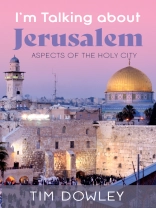On the famous mappa mundi, housed in Hereford Cathedral, Jerusalem is at the center of the world.
For Jews, Christians, and Muslims, this holy city represents not merely a physical focus for their faith, but a theological and spiritual emblem: simultaneously a very earthly city and a uniquely celestial kingdom. How has this insignificant city become such a critical location in geopolitics and psychogeography? I’m Talking about Jerusalem explores the many and varied meanings and resonances of ‘Jerusalem’–in history, prophecy, theology, literature, imagery, and myth.
‘Jerusalem’ appears 806 times in the Bible. For the Jews, Jerusalem is not simply a significant physical place, past and present, but a religious concept transcending time. For Christians, it is the site of Jesus’s last days–and of countless Christian structures, relics, and remains. Islamic tradition has celebrated the city with seventeen names; it was a key stage in Muhammad’s night journey and became Islam’s third holiest place of pilgrimage. For all three Abrahamic religions, Jerusalem is a major pilgrimage destination.
Aldous Huxley wrote, ‘We have each of us our Jerusalem’–a vision of what life might be. I’m Talking about Jerusalem considers Jerusalem as a political goal and eternal home; its place in Jewish, Christian, and Islamic eschatology; and as a metaphor for all we yearn for in this world and the next. A place of perfection and conclusion, a golden city, a paradise to be attained after death.
Over de auteur
Tim Dowley is a London-based historian, author, and poet. His much-praised Handbook to the History of Christianity has been continuously in print since 1977. His most recent books include Defying the Holocaust; Christian Music: A Global History; and Johann Sebastian Bach: An Illustrated Biography.












